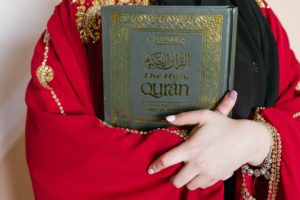By: Ajla Alisic
Ramadan is one of the most beautiful months on the calendar. It teaches us kindness, patience, and sacrifice. Muslims all over the world come together and partake in a fast. The fast consists of not consuming anything – eating or drinking – from just before the sun comes up to just after the sun goes down. The month is based on a Lunar Calendar, not the Gregorian Calendar, and thus it comes at different times for those of us who live in the United States. In 2021, Ramadan started at sundown on April 12 and ended at sundown on May 12. It takes a lot of patience to go about the day as normal as possible with no sustenance.
Ramadan is especially tough for those of us who live outside of majority Muslim countries as nothing changes in our day-to-day life. Our coworkers still have lunch, folks bring cupcakes to meetings, and we are offered treats that coworkers brought to work in celebration of something that happened. As Muslims, we must not only kindly pass on those offerings, but also in our soul not begrudge those people. They did not show us any malice and we cannot hold any against them. Ramadan teaches us to be more kind and loving people. It helps us grow and be more patient. It brings us inner peace.
Another tough thing about Ramadan in recent history is the COVID-19 pandemic. Even though Mosques are open again, they are quite different than I remember then as a child. Going to the Mosque used to be such a communal experience, especially during Ramadan. After prayer, we would always break our fast with the Iftar meal and one or two families would provide the meal. We would all eat together and it was wonderful. There was so much joy. Today, everyone has to bring their own Sajjadat (prayer rug), we must take our Abdest at home, and we have to be spaced out when praying. Taking our Abdest is cleansing our body before prayer, which is usually done in a bathing room at the Mosque. And praying spaced apart is definitely not the same as shoulder to shoulder with your fellow brothers or sisters. And Iftar is had strictly at home with your closest loved ones. I am thankful to have my family, but it is a very different experience.
As a child, I remember the lovely smells of all the foods my mom cooked. I remember that she always made the best Bosnian deserts, and of course, Baklava. She would go all out for Eid; the celebration at the end of Ramadan. My sister and I would clean the whole home, top to bottom. Everything was just perfect for Eid. The whole family would be together. We would stuff our faces with my mother’s goodies. And my parents always made sure they would have some small gifts for us. Even as refugees in Germany and as immigrants in the United States, they always made sure the holiday was special for us.
These days, I still spend the days before Eid cleaning the home top to bottom. And my mom still cooks up a storm. But instead of getting spoiled, I get the privilege of spoiling my nieces and nephew. We spend the month of Ramadan talking about our culture and history at different times. We spend time giving each other henna tattoos to remind ourselves of our roots. And when Eid finally arrives, I love spending the day listening to them giggle and play. The traditions my parents instilled in my sister and me will live on past them, and hopefully past us. Family traditions are so important. Religious freedoms are important as well. Islam is a religion rooted in love, acceptance, and patience. I have hope that the world will see that again with time.
